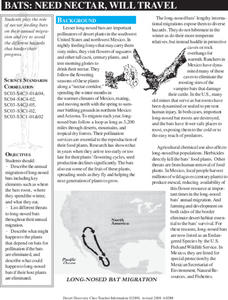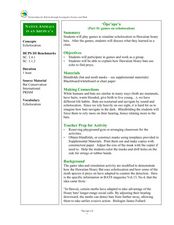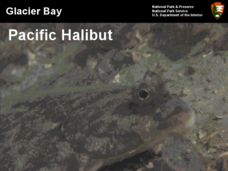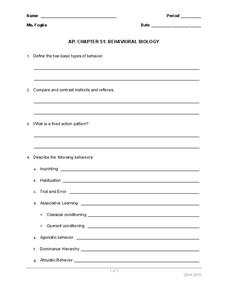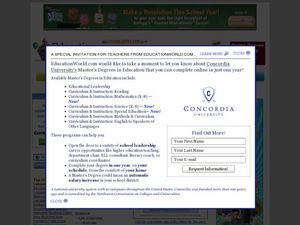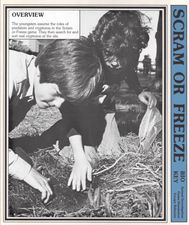TED-Ed
How to Speak Monkey: The Language of Cotton-Top Tamarins
Tamarin monkey language can be categorized by stem upsweep, duration, peak frequency, and frequency change. Although other complex terminology is used to describe the 38 calls of this species, the video is easy to follow and a...
Curated OER
Animal Behavior
Can you train a worm? Biology buffs will have a blast trying! Using planaria or earthworms, they introduce a certain stimulus repeatedly until the desired response happens more quickly. They also explore the response of their own eyes to...
Curated OER
Bats: Need Nectar, Will Travel
Beginning wildlife biologists become adult bats, baby bats, snakes, owls, bobcats, or land-clearing developers in a grand role-playing activity. In a large open space, they play a game in which they move to designated areas based on what...
Curated OER
Games on Echolocation
Get a little batty with life science! This fun simulation game replicates how bats use echolocation to hunt moths in their native Hawaiian habitat. After creating blind folds and discussing some basic principles of echolocation, students...
Curated OER
Isopod Behavior, of the Rolly Polly Lab
Students investigate the behavior of isopods. In this isopod lesson plan, students make observations of an isopod and sketch the pillbug. They study the orientation of the isopods in relation to moisture in a chamber they construct from...
Prince William Network
The Incredible Journey
Divide your school gym into breeding grounds and non-breeding grounds so that your zoologists can play a game simulating the seasonal migration of shorebirds. Players pick one of the included game cards and follow its directions, which...
Curated OER
Glacier Bay Pacific Halibut
The National Park Service has produced a high-quality presentation on the halibut population of Glacier Bay, Alaska. It takes the viewpoint of the marine biologists or rather, ichthyologists, who have been studying the adaptations,...
Curated OER
The Old White Sheet Trick
Students attract night animals. In this Science lesson, students use a large white surface and a light at night. Students observe and record what they see.
Curated OER
Leapin' Lizards
Third graders lure lizards with different foods and observe what the lizard eats. In this animal behavior lesson, 3rd graders discover how lizards eat and their behaviors when more than one lizard is present. Students create their...
Curated OER
Behavioral Biology
Ten questions about animal behaviors make up this AP biology worksheet. Learners explain behaviors such as instinct, reflexes, imprinting, dominance, and defending territory. Question #6 is in reference to a PowerPoint presentation that...
Curated OER
Behavioral Biology
This document was produced as a reading guide for a specific textbook chapter on behavioral biology. Suitable for an AP or college-level biology course, it contains sixteen short-answer questions pertaining to animal behavior. Consider...
Curated OER
Academic Raceway: Animals
This animals PowerPoint provides a race car game in which students answer a variety of questions about animals, the majority of which are based on ways in which animals adapt to their surroundings and behave to survive.
Curated OER
Night Eyes
Fifth graders identify nocturnal animals based on specific characteristics. In this animals lesson plan, 5th graders observe an area at night using flashlights. Students record their findings and discuss as a group.
Curated OER
Blue Planet: Tidal Seas
Learners investigate how tides affect sea life. In this video based lesson plan, students view a video on how tides affect sea life. They do web-based research to find the answers to a series of questions and then play Tidal Trivia to...
Curated OER
Good Training = Good Pets
Students examine animal behavior. In this animals training lesson, students understand a pet owner's responsibility for their pet's behavior. Students get into groups and brainstorm situations that pet's make a mistake that they are...
Curated OER
Shaun Ellis: Leader of the (Wolf) Pack
Students react to a statement about living with wolves, then read a news article about Shaun Ellis and his time living with wolves. In this current events and wolves lesson plan, the teacher introduces the article with a discussion and...
Curated OER
Spiders Build Giant Web in Texas Park
Students make predictions about a photograph of a humongous spider web, then read a news article about thousands of spiders that worked together to build it. In this biology and current events lesson plan, the teacher introduces the...
Curated OER
Animals And Behavior
In this animal behavior worksheet, students solve four different kinds of puzzles based on animal behavior vocabulary. There are 8 word scrambles, 6 analogies, 5 crazy eights and 5 short answer questions.
Curated OER
Termite Trail Marking Behavior
Learners examine termites and their trail-marking behaviors. They draw lines on paper with various ink pens and experiment to see which types of ink the termites follow--or which inks do and do not elicit trail marking behavior.
Curated OER
AP Biology Lab Review
A seventy-two slide PowerPoint that reviews several lab explorations done in an AP Biology course. For each lab there is a description, concepts, and conclusions. Many pictures and graphics make this visually appealing, but it would not...
Curated OER
Scram or Freeze
Students participate in a role-play game. In this cryptozoa activity, students simulate the roles of predator and cryptozoa in a game called Scram or Freeze.
Curated OER
Who Goes There?
Young scholars discover behaviors of nocturnal animals. In this animal behavior instructional activity, students conduct a night time experiment with black light tracing materials to observe nocturnal animal behavior in the wild.
Curated OER
Bird Brained
Students examine bird anatomy and explain bird intelligence. For this animal behavior lesson students research the Internet on bird behavior and work in groups to complete a challenge.
Curated OER
Habitat Choice in Woodbugs
Pupils investigate woodbugs. In this scientific investigation lesson, students explore the steps scientists take when conducting an investigation using live specimens. Pupils explore habitat preferences for woodbugs in various...




